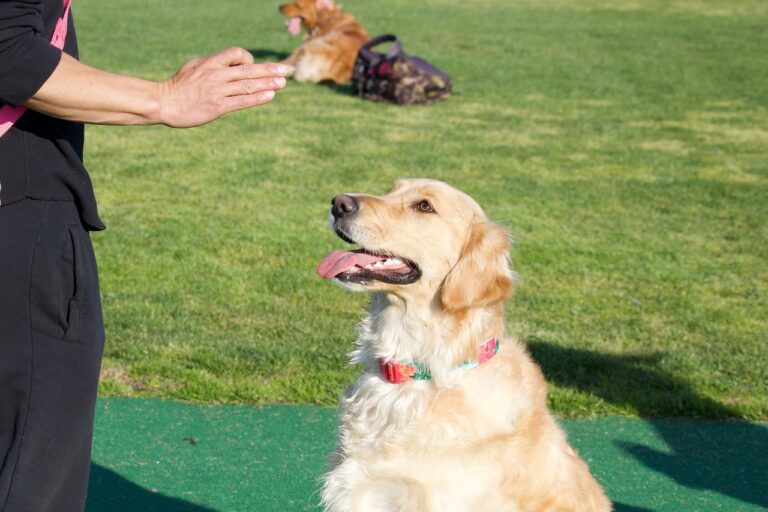The Golden Retrievers Glorious Past: Unveiling Their History and Legacy
The Golden Retriever: A Beloved Breed
If you’re considering adding a furry companion to your family, the Golden Retriever is a breed that deserves your attention. Known for their friendly nature, loyalty, and intelligence, Golden Retrievers have captured the hearts of dog lovers worldwide. In this section, we will introduce you to the Golden Retriever breed and explore the reasons why choosing a Golden Retriever might be the perfect fit for you.
Introduction to the Golden Retriever
Golden Retrievers are medium to large-sized dogs with a distinctive golden or cream-colored coat. They have a well-balanced and sturdy build, exuding an air of elegance and athleticism. This breed is renowned for its friendly and outgoing personality, making them excellent companions for individuals and families alike.
Their expressive eyes and ever-wagging tail reflect their love for human interaction and their desire to please. Golden Retrievers are known to be gentle, patient, and tolerant, making them fantastic playmates for children and compatible with other pets. To learn more about the Golden Retriever’s role as a family pet, you can refer to our article on the Golden Retriever’s role as a family pet.
Why Choose a Golden Retriever?
There are several compelling reasons why the Golden Retriever breed stands out among the many dog breeds available. Here are a few key factors that make Golden Retrievers a popular choice:
-
Family-Friendly Nature: Golden Retrievers are known for their love of children and their ability to form strong bonds with family members. Their patient and gentle nature make them great companions for families of all sizes.
-
Social and Friendly Disposition: Golden Retrievers have a natural affinity for people and are generally friendly towards strangers and other animals. Their sociable nature makes them excellent candidates for therapy and assistance work. Learn more about Golden Retrievers as therapy and assistance dogs in our dedicated article on Golden Retrievers as therapy and assistance dogs.
-
Intelligent and Eager to Please: Golden Retrievers are highly intelligent dogs, making them easy to train. They thrive on positive reinforcement and enjoy learning new commands and tricks. For more information on training Golden Retrievers, check out our article on the benefits of training classes for Golden Retrievers.
-
Versatile and Adaptable: Whether you live in an apartment or a house with a large yard, Golden Retrievers can adapt to various living environments. They are versatile dogs that enjoy both indoor and outdoor activities. To keep your Golden Retriever happy and active, explore our article on activities and games to keep your Golden Retriever happy.
By choosing a Golden Retriever, you are welcoming a loyal and loving companion into your life. However, it’s important to remember that this breed requires proper care, training, and socialization to thrive. In the following sections, we will delve deeper into the history, temperament, care, and training needs of the Golden Retriever breed. Stay tuned to discover more about this remarkable breed and how to provide them with a fulfilling and happy life.
A Glimpse into History
To truly appreciate the Golden Retriever breed, it’s important to delve into its rich history. Understanding the origins and purpose behind the breed’s development allows us to appreciate the qualities that make them so beloved today.
Origins of the Golden Retriever
The Golden Retriever breed originated in the Scottish Highlands during the late 19th century. It was developed by crossing various breeds, including the now-extinct Tweed Water Spaniel and the Yellow Retriever (an ancestor of the Labrador Retriever). The breeding efforts were led by Sir Dudley Marjoribanks, later known as Lord Tweedmouth. His goal was to create a versatile retriever that excelled in both water and land retrieving.
The first Golden Retrievers were officially recognized in 1911 by The Kennel Club (UK), and the breed quickly gained popularity for its exceptional retrieving skills, gentle temperament, and striking golden coat.
Purpose and Early Development
The Golden Retriever’s purpose was to assist hunters in retrieving game, particularly waterfowl, in both wet and dry conditions. They were bred to have a keen nose, a soft mouth for carrying game without damaging it, and an innate love for water. Their intelligence, trainability, and love for people also made them excellent companions, leading to their popularity as family pets.
During the early development of the breed, careful selection and breeding focused on creating dogs that possessed the desired traits. This included not only their retrieving abilities but also their friendly nature, adaptability, and overall soundness. These qualities remain hallmarks of the Golden Retriever breed today.
As the breed gained recognition and popularity, Golden Retrievers were exported to other countries, including the United States. The American Kennel Club officially recognized the breed in 1925, further establishing its presence and popularity worldwide.
By understanding the origins and purpose behind the development of the Golden Retriever, we can better appreciate the breed’s unique characteristics and the legacy they carry. In the following sections, we will explore the traits and notable achievements of these remarkable dogs.
The Legacy of the Golden Retriever
The Golden Retriever breed has left an indelible mark throughout its history, earning a well-deserved reputation for its exceptional traits and notable achievements. Let’s explore the enduring legacy of these beloved dogs.
Traits and Characteristics
Golden Retrievers possess a range of traits and characteristics that make them stand out among other breeds. These qualities contribute to their popularity and make them a sought-after choice for families and individuals alike. Here are some notable traits of Golden Retrievers:
-
Friendly and Gentle: Golden Retrievers are renowned for their friendly nature and gentle disposition. They are known to be affectionate, patient, and tolerant, making them great companions for individuals of all ages, including children. To learn more about the Golden Retriever’s family-friendly nature, check out our article on the Golden Retriever’s friendly nature: what to expect.
-
Intelligent and Trainable: Golden Retrievers are highly intelligent dogs that excel in obedience and agility training. They have a natural eagerness to please their owners and readily respond to positive reinforcement techniques. Their intelligence and trainable nature make them ideal candidates for various roles, including therapy and assistance work.
-
Versatile Working Ability: Originally bred as hunting companions, Golden Retrievers have shown their versatility in various fields. They have excelled in search and rescue operations, as guide dogs for the visually impaired, and in therapy work due to their gentle and empathetic nature. The Golden Retriever’s willingness to work and their adaptability make them a valuable asset in many settings.
-
Water Enthusiasts: Golden Retrievers have a special affinity for water. Their love for swimming and retrieving objects from the water is deeply ingrained in their history. This makes them excellent companions for outdoor activities near water bodies. To learn more about building a safe and fun relationship between Golden Retrievers and water, refer to our article on Golden Retrievers and water: building a safe and fun relationship.
Notable Achievements and Contributions
Golden Retrievers have made significant contributions in various fields, showcasing their exceptional abilities and proving their worth as an exceptional breed. Here are a few notable achievements and contributions:
-
Search and Rescue Dogs: Golden Retrievers have demonstrated their incredible scenting abilities and tracking skills in search and rescue operations. Their keen sense of smell and determination have helped locate missing persons and provide comfort in times of crisis.
-
Therapy and Assistance Dogs: Golden Retrievers have shown exceptional aptitude as therapy dogs, providing comfort and emotional support to individuals in hospitals, nursing homes, and other settings. They have also been trained as assistance dogs to aid individuals with disabilities, enhancing their independence and quality of life.
-
Guide Dogs for the Visually Impaired: Golden Retrievers have been successfully trained as guide dogs for individuals with visual impairments. Their intelligence, adaptability, and calm demeanor make them excellent guides, helping their visually impaired partners navigate the world with confidence.
-
Competitive Success: Golden Retrievers have achieved remarkable success in various dog sports and competitions. They excel in obedience trials, agility competitions, and field trials, showcasing their athleticism, intelligence, and versatility.
The legacy of the Golden Retriever extends far beyond their charming appearance. Their exceptional traits, notable achievements, and contributions in various fields make them a highly respected and beloved breed. Whether as family pets, working dogs, or competitive athletes, Golden Retrievers continue to leave their mark on the hearts of dog lovers around the world.
Understanding the Golden Retriever’s Temperament
When considering the Golden Retriever as a potential addition to your family, it’s important to understand their temperament and what to expect from this beloved breed.
Family-Friendly Nature
Golden Retrievers are renowned for their family-friendly nature. They thrive in the company of their human pack and form strong bonds with their owners. Their gentle and patient disposition makes them excellent companions for all family members, including children. Golden Retrievers are known to be tolerant and affectionate, making them a popular choice for families with young children.
These friendly dogs often have a natural instinct to protect and care for their families. Their loyalty and devotion make them wonderful family pets, always ready to provide comfort and companionship. However, it’s important to note that early socialization and training are crucial to ensure their friendly nature is properly channeled. For tips on introducing a Golden Retriever into a multi-pet household, check out our article on integrating a Golden Retriever into a multi-pet household.
Social and Friendly Disposition
Golden Retrievers are known for their social and friendly disposition. They have a natural ability to get along well with other dogs and animals, making them a great choice for households with existing pets. Their friendly nature also extends to strangers, as Golden Retrievers often greet new faces with enthusiasm and a wagging tail.
Their sociable nature makes them well-suited for various activities and environments. Golden Retrievers can thrive in urban settings as long as they receive proper exercise, mental stimulation, and social interaction. They enjoy being part of the family’s daily activities and are always eager to participate in outings, hikes, or trips to the park.
To ensure your Golden Retriever remains well-behaved and friendly in various social situations, early and consistent training is essential. Consider enrolling your Golden Retriever in training classes, which provide structured learning environments and opportunities for socialization. For more information on the benefits of training classes, check out our article on the benefits of training classes for Golden Retrievers.
Understanding the temperament of a Golden Retriever is vital in determining if this breed is the right fit for your family. Their family-friendly nature and social disposition make them a popular choice for those seeking a loyal and affectionate companion. However, it’s important to remember that individual temperaments may vary, and early socialization and training are key to nurturing and shaping their friendly and sociable nature.
Caring for Your Golden Retriever
Taking proper care of your Golden Retriever is essential for their overall health and well-being. This section will cover two important aspects of caring for your Golden Retriever: exercise needs and activity level, and grooming requirements.
Exercise Needs and Activity Level
Golden Retrievers are an active and energetic breed that requires regular exercise to keep them happy and healthy. Daily exercise helps prevent behavioral issues and keeps them mentally stimulated. Aim for at least 30-60 minutes of exercise each day, which can be a combination of walks, playtime, and interactive activities.
Engaging in activities that allow your Golden Retriever to use their natural instincts, such as retrieving games and swimming, can be particularly enjoyable for them. Golden Retrievers have a natural affinity for water, so consider incorporating water-based activities into their exercise routine. For more information on Golden Retrievers and water activities, check out our article on golden retrievers and water: building a safe and fun relationship.
It’s important to note that exercise needs may vary depending on your Golden Retriever’s age, health, and individual energy levels. Puppies may require shorter bursts of exercise throughout the day to prevent overexertion, while older dogs may require gentle exercise that is easier on their joints. Always monitor your dog’s behavior and adjust their exercise routine accordingly.
Grooming Requirements
Golden Retrievers have a dense double coat that requires regular grooming to keep it healthy and free from mats and tangles. Here are some essential grooming tasks to include in your Golden Retriever’s care routine:
-
Brushing: Regular brushing helps remove loose hair, prevents matting, and keeps the coat looking its best. Use a slicker brush or a grooming rake to gently brush your Golden Retriever’s coat, paying extra attention to areas prone to matting, such as behind the ears and under the tail.
-
Bathing: While Golden Retrievers don’t require frequent baths, occasional bathing is necessary to keep their coat clean and odor-free. Use a mild dog shampoo and thoroughly rinse to remove all soap residue. Avoid over-bathing, as it can strip the coat of its natural oils.
-
Ear Care: Golden Retrievers are prone to ear infections, so regular ear cleaning is crucial. Use a veterinarian-recommended ear cleaner and gently wipe the outer ear with a cotton ball or a soft cloth. Avoid inserting anything into the ear canal, as it can cause injury.
-
Nail Trimming: Trim your Golden Retriever’s nails regularly to prevent them from becoming too long and causing discomfort. If you’re uncomfortable with trimming nails yourself, consult a professional groomer or a veterinarian.
-
Dental Care: Good oral hygiene is important for your Golden Retriever’s overall health. Brush their teeth regularly with a dog-friendly toothbrush and toothpaste. Additionally, provide dental chews or toys to help keep their teeth clean.
For more detailed grooming tips and techniques, refer to our article on golden retriever grooming essentials.
By meeting your Golden Retriever’s exercise needs and maintaining a regular grooming routine, you can ensure that they stay healthy, happy, and well-cared for. Remember to approach grooming sessions with patience and positive reinforcement to create a positive experience for your furry friend.
Training and Socialization
Training and socialization are essential aspects of raising a well-behaved and happy Golden Retriever. These intelligent and eager-to-please dogs thrive in environments that provide consistent training and positive reinforcement. In this section, we will explore the intelligence of Golden Retrievers and provide some training tips and techniques to help you effectively train your furry companion.
Intelligent and Eager to Please
Golden Retrievers are known for their high level of intelligence and willingness to please their owners. This combination makes them highly trainable and responsive to commands. They are quick learners and excel in various training activities, including obedience training, agility, and even advanced tricks.
When training your Golden Retriever, it’s important to use positive reinforcement techniques. Reward-based training methods, such as using treats, praise, and play, are highly effective in motivating these dogs. They respond well to positive feedback and are eager to earn your approval.
Consistency is key when training a Golden Retriever. Establish a clear set of rules and boundaries from the beginning and be consistent in enforcing them. Use clear and concise commands, and reward your dog when they respond correctly. Remember to be patient and give your Golden Retriever time to understand and execute the desired behaviors.
Training Tips and Techniques
Here are some training tips and techniques to help you get started with training your Golden Retriever:
-
Start early: Begin training your Golden Retriever as early as possible, ideally during puppyhood. This allows you to establish good habits and prevent any potential behavior problems from developing.
-
Socialize your dog: Socialization is crucial for Golden Retrievers. Expose them to different people, animals, and environments to help them develop good social skills and reduce the chances of fear or aggression issues later on. Check out our article on the benefits of training classes for Golden Retrievers for more information.
-
Use positive reinforcement: Reward your Golden Retriever with treats, praise, and play whenever they exhibit the desired behavior. This positive reinforcement strengthens the connection between the behavior and the reward, increasing the likelihood of them repeating the behavior in the future.
-
Keep training sessions short and frequent: Golden Retrievers have a relatively short attention span, so it’s important to keep training sessions short and engaging. Aim for multiple short sessions throughout the day rather than one long session.
-
Be patient and consistent: Training takes time and consistency. Be patient with your Golden Retriever and avoid getting frustrated. Consistency in your commands, expectations, and rewards will help them understand what is expected of them.
-
Use clicker training: Clicker training can be an effective technique for Golden Retrievers. The click sound marks the desired behavior, followed by a reward. This method helps to create clear communication between you and your dog.
Remember to tailor the training techniques to the individual needs and personality of your Golden Retriever. Some dogs may respond better to certain methods than others. If you’re having difficulty with training or need additional guidance, consider seeking assistance from a professional dog trainer who specializes in positive reinforcement training methods.
By investing time and effort into training your Golden Retriever, you will not only have a well-behaved companion but also strengthen the bond between you and your furry friend. Training provides mental stimulation and helps keep your Golden Retriever happy and fulfilled.






